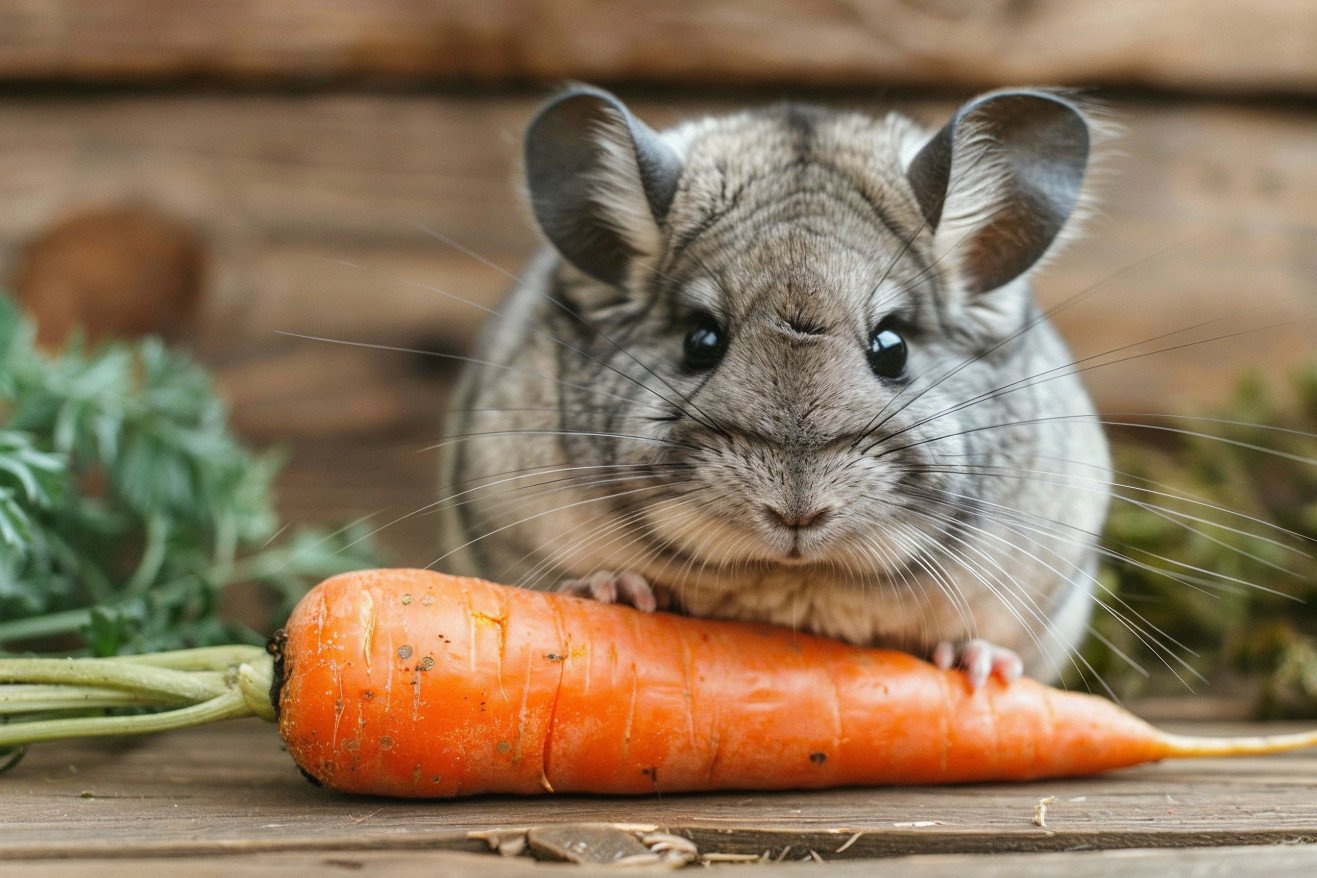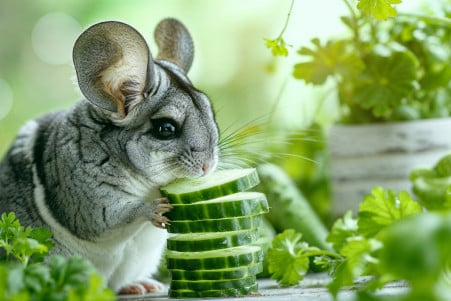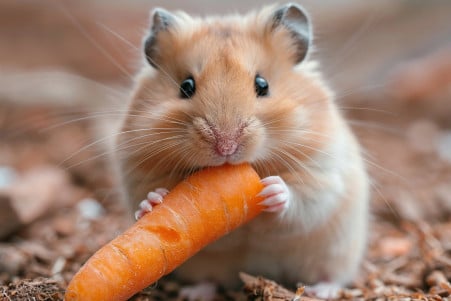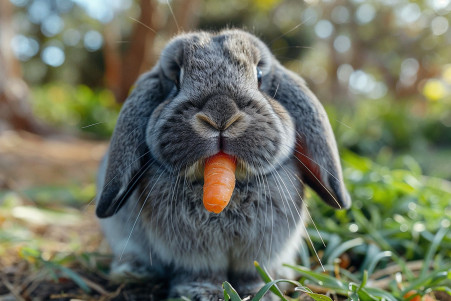Can Chinchillas Eat Carrots? A Dietitian's Guide
14 April 2024 • Updated 13 April 2024

Whether or not chinchillas can eat carrots is a little more complicated than you might expect – let's talk about what these special animals need. Chinchillas can eat carrots, but they should be fed sparingly. Carrots are high in sugar and should only account for 10% of a chinchilla's diet, which should be made up mostly of high-fiber hay and pellets. If chinchillas eat too many carrots, they can become obese and experience digestive and other health issues.
Although carrots do contain some important nutrients like beta-carotene, vitamin K, and fiber, chinchillas have very specific nutritional needs that are different from humans and other animals. To determine whether or not chinchillas can eat carrots and how much they should have, we need to look at the latest research and expert advice from veterinarians and exotic animal nutritionists. By doing this, we can learn what the best diet is for these small, active animals.
Can chinchillas eat carrots?
What Do Chinchillas Eat? A Diet of Hay, Pellets, and Water
Chinchillas are herbivores and have sensitive digestive systems that require a high-fiber diet. The most important part of their diet is unlimited access to high-quality grass hay, such as timothy or orchard grass. Hay is essential for keeping their teeth from overgrowing and ensuring that their digestive system runs smoothly.
In addition to hay, chinchillas should be fed a grass-based pellet diet to make sure that they get all of the nutrients that they need. Most experts recommend feeding chinchillas 1-2 tablespoons of pellets a day. Chinchillas should also have access to fresh, clean water at all times, which is typically provided by a sipper bottle.
It's important to note that chinchillas can't handle sudden changes in their diet because of their sensitive digestive systems. If you need to change your chinchilla's diet, do so slowly over several weeks to avoid issues like diarrhea or gastrointestinal stasis. As long as they're fed a diet that's high in fiber and includes plenty of hay and water, chinchillas can avoid dental and digestive issues throughout their lives.
Carrots and Other Vegetables: Safe Options and Moderation
Carrots and other high-sugar, high-water content vegetables like sweet potatoes may seem like a healthy treat, but they can actually be quite dangerous for chinchillas. Quality Cage explains that the high sugar content in carrots can be harmful to chinchillas if they eat too much of it, leading to obesity and other health problems.
That said, there are some vegetables that are safe for chinchillas to eat in moderation, including alfalfa, bell peppers, and zucchini. ExoticDirect even lists these veggies as part of a chinchilla's staple diet, but they should only be fed in small amounts, with a recommended serving size of about a teaspoon per day.
It's important to note that new vegetables should be introduced to your pet's diet slowly and in small amounts. Exotic Nutrition warns that sudden changes in a chinchilla's diet can lead to digestive issues. It's also a good idea to check with a vet before introducing new foods to your pet's diet, as chinchillas have very specific dietary needs.
In general, fresh vegetables should be considered a treat rather than a staple of a chinchilla's diet. As Quality Cage explains, the best diet for these small herbivores is one that's low in moisture and high in fiber, like timothy hay and chinchilla pellets.
A Regular Feeding Schedule and Portion Sizes
It's important to have a regular feeding schedule to keep your chinchilla healthy. The Flamingo Pet Clinic recommends that chinchillas have access to fresh, high-quality timothy or orchard grass hay at all times. They also suggest feeding 1-2 tablespoons of grass-based pellets once a day as a meal.
When it comes to fresh veggies, Exotic Nutrition suggests that you start by feeding them to your chinchilla in small amounts, such as a teaspoon a day. This will help your chinchilla's sensitive stomach get used to the new food and avoid issues like diarrhea and bloating.
Feeding your chinchilla too much or too little can lead to health issues. Flamingo Pet Clinic warns that even a small increase in portion sizes can lead to obesity and other health problems. By keeping a close eye on your chinchilla's eating habits and bowel movements, you can catch any potential digestive issues early.
Your chinchilla's dietary needs may also change as they get older or if their activity level changes. Small Pet Select suggests that you talk to your vet to make sure that you're feeding your chinchilla the right portion sizes based on their age and health. However, as long as you're feeding them the right amount of hay, pellets, and fresh veggies, your chinchilla should be able to stay healthy and happy.
Potential Health Problems of a Poor Chinchilla Diet
Feeding your chinchilla an improper or unbalanced diet can lead to a number of health problems. The Merck Veterinary Manual explains that chinchillas have a high requirement for dietary fiber, and their diet should be made up mostly of high-quality grass hay. If your chinchilla is fed a diet that's high in calcium and low in phosphorus, like alfalfa hay, it can result in the formation of urinary calculi, urolithiasis, and other kidney issues.
Dental disease is another common issue that can result from a poor diet. The Merck Veterinary Manual says that signs of dental disease include decreased appetite, weight loss, and poor coat quality. Gastric ulcers and gastrointestinal problems, including diarrhea and constipation, can also occur when a chinchilla is fed coarse, fibrous roughage or when their diet is changed too quickly.
Of particular concern is the potential for calcium-phosphorus imbalance, which is discussed in a PetMD article. This nutritional disorder can cause severe muscle spasms and result in bones that are weak and prone to breaking. It's important to seek veterinary care immediately if you notice any signs of malnutrition or diet-related health problems in your chinchilla.
To help prevent these and other health issues, it's important to make sure your chinchilla's diet is well-balanced and high in fiber. Burgess Pet Care explains that you can help catch potential diet-related problems early by closely observing your pet's behavior, eating patterns, and droppings.
How to Change a Chinchilla's Diet
Changing a chinchilla's diet can be a slow process, but it's important to take your time to ensure that your pet doesn't experience any negative side effects. According to Cuddlebug Chinchillas, sudden changes in a chinchilla's diet can lead to digestive problems like diarrhea or gastrointestinal stasis. Instead, they recommend a four-week transition period.
During the first week, mix the new hay, pellets, or fresh vegetables with the old food, using a 75/25 ratio. Then, slowly increase the amount of new food while decreasing the amount of old food until you're feeding your chinchilla 100% new food by the end of the fourth week. Chinchilla-Scientia.com recommends introducing new foods one at a time, starting with dried herbs and then gradually adding fresh greens, fruits, and vegetables.
If your chinchilla is resistant to trying the new food, Exotic Nutrition suggests reducing the amount of food you're feeding your pet to make them hungrier and more likely to try the new food. You can also try mixing the new food with the old food or using herbs to make the new food more appealing. However, it's important to be patient and consistent, as it may take several weeks for your chinchilla to accept the new diet.
If your chinchilla continues to resist the new diet or shows signs of digestive problems, like diarrhea, constipation, or bloating, Small Pet Select recommends contacting a veterinarian. However, with time and patience, it's possible to change a chinchilla's diet to one that's high in fiber and meets their unique nutritional needs.
Conclusion: How to Make Sure Your Chinchilla Is Eating a Balanced Diet
In conclusion, a high-fiber, hay-based diet is the most important part of a chinchilla's diet and is necessary for its health and well-being. Although chinchillas can eat carrots and other vegetables, they should only be given as treats and should not make up more than 10% of a chinchilla's diet because of their high sugar content. Overconsumption of these types of treats can lead to health problems like obesity and digestive issues.
It's also important to make sure that chinchillas are being fed on a regular schedule and are being given the right amounts of hay, pellets, and vegetables. An unbalanced or inappropriate diet can lead to dental issues, calcium-phosphorus imbalances, and other long-term health problems. It's also important to consult a vet before making any changes to a chinchilla's diet to make sure that their specific nutritional needs are being met.
If you're trying to change your chinchilla's diet, it's important to be patient and make changes slowly to avoid digestive issues. With the right care and a focus on making sure that they're eating a balanced, high-fiber diet, chinchillas can be healthy and live long lives.


